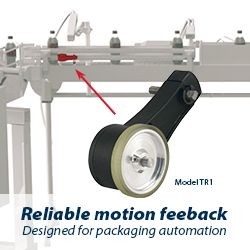I wish to promote a discussion among our Customers and End Users about why they should use and require physical barriers (mesh panels) – also called “Perimeter Protection”.
Protection - Arguments for Safer Working Environment
Thomas Widstrand | Troax
In hearing the phrase “Protection” it would be easy to think that I am discussing or recommending some sort of child-proofing materials, however, this is clearly not the case. Instead, I wish to promote a discussion among our Customers and End Users about why they should use and require physical barriers (mesh panels) – also called “Perimeter Protection”.
The easiest and most obvious reason is – of course – to protect the employees working in dangerous and hazardous environments where automated machinery is in use. Hopefully, every responsible Employer wants their employees to have a safe, secure working environment.
If this is not the case (which in some parts of the world is still occurring) here are six additional arguments for the use of Perimeter Protection:
- Increased productivity
By Eliminating the risk of personal injury in the area(s) in question, employees can concentrate on the tasks at hand, thereby increasing overall productivity.
- Increased performance
By providing the correct perimeter protection and guarding, unauthorised personnel are prevented from entering restricted areas; this eliminates interference in the processes and costly machinery and equipment stoppages.
- Improved Safety
By undertaking proper Risk Analysis and implementing the correct sensors and mesh panels you can streamline your process, increasing BOTH safety AND effectiveness. I recommend you reading ”How safety technology improvements increase productivity”, Packaging World, which provides additional perspective on the issue.
- Compliance with Standards and Regulations
By implementing the correct Perimeter Protection and controls you will ensure that you comply with all of the necessary and relevant standards and regulations (ISO, Machinery Directive, ANSI, Health & Safety, etc.), protecting and safeguarding your Personnel, Property, and Processes; this can avoid unnecessary visits from regulation and inspection authorities.
- Profitable Returns
By investing a small amount (implementing proper machinery and perimeter protection systems is actually very cost effective!) initially you will standardise your processes, improving automation, and reducing overall costs. When you compare the cost of implementing proper perimeter protection and guarding (typically 1-2% of overall costs) against the cost of replacing a machine (or worse yet – an entire production line!) because of unscheduled stoppages or unintentional damage the massive overall cost savings of safety becomes immediately apparent.
- Peace of Mind
Last -but not least- you will sleep better at night knowing that you as an employer have made an informed moral decision to provide the best and safest possible working environment for your employees.
There really is nothing that will stop you from getting the well-designed protection that you want for your automated processes and machinery. Troax offers simple, easy-to-use, cost-effective solutions in any colour or corporate scheme alongside world-renowned quality and branding to provide you with the best possible protection systems on the market today. With our highly-skilled technicians who are experts in combining safety with productivity, we can easily provide you with design options and installation services to suit your requirements.
For me personally, as the President of a safe-guarding company which consistently strives to assist all of our customers with their safety requests, “Playing it Safe” is a very easy process of which I am very happy to be an integral part.
Troax, Inc.
 Troax ensures protection from hazardous areas and secures valuable property, with wire mesh machine protection, warehouse partitioning and storage solutions. Safety, versatility and accessibility are a result of many years of development.
Troax ensures protection from hazardous areas and secures valuable property, with wire mesh machine protection, warehouse partitioning and storage solutions. Safety, versatility and accessibility are a result of many years of development.
The content & opinions in this article are the author’s and do not necessarily represent the views of ManufacturingTomorrow
Comments (0)
This post does not have any comments. Be the first to leave a comment below.
Featured Product

